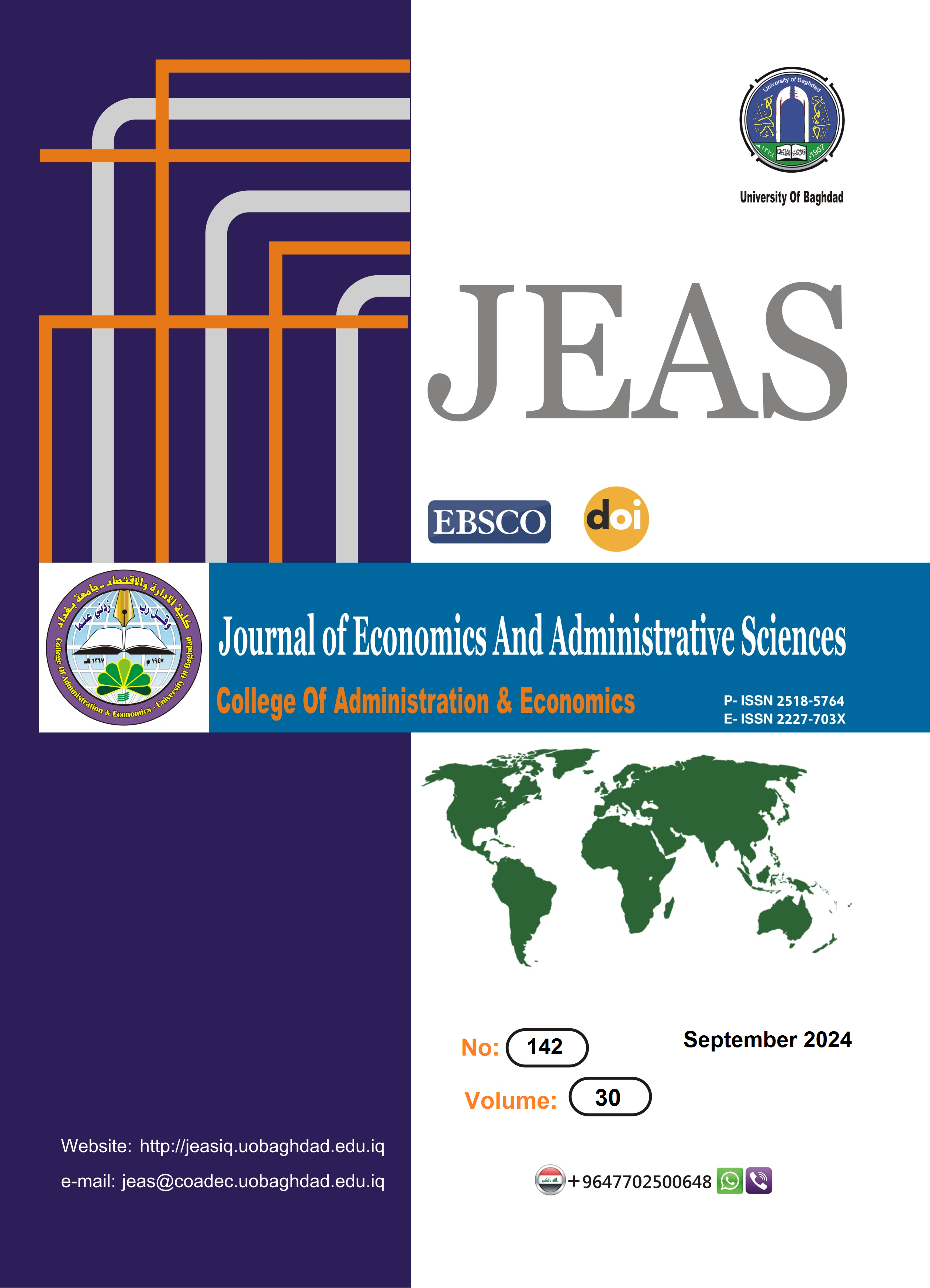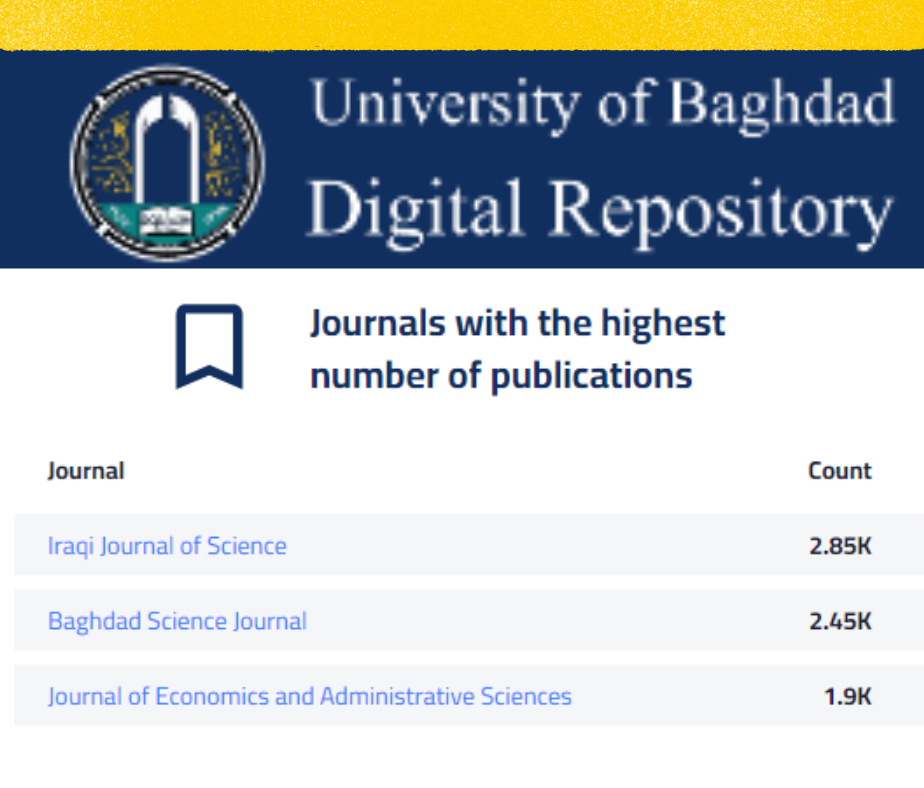The impact of competency-based human resources management and the resource-based approach on creative performance by mediating the knowledge economy: An analytical research in the Central Bank of Iraq
DOI:
https://doi.org/10.33095/g3hvsk47Keywords:
Competency-Based Human Resources Management , The Resource-Based Approach , Creative Performance, Knowledge EconomyAbstract
The research aims to clarify the effect of competency-based human resources management and the resource-based approach on creative performance through the mediating role of the knowledge economy. As a result of the pressures and challenges faced by the Central Bank, which requires efficient, distinguished and knowledgeable human resources, the researchers prompted the researchers to choose these variables through which to address some problems. Its importance is to help business organizations focus on intangible assets more than tangible assets. The research was launched from two main hypotheses to explore the relationships of influence by analyzing the answers of the research sample, which included (223) individuals working in the Central Bank of Iraq. Data and information were collected using a questionnaire, personal interviews, as well as field presence. The data were analyzed using the statistical program (SPSS_V.19) and a set of statistical methods such as factor analysis, the arithmetic mean, the standard deviation, the coefficient of variation, the correlation coefficient (person), and the multiple linear regression equation. The most prominent findings of the research are the contribution of human resources management based on competence and the resource-based approach to more interpretation of creative performance when there are intermediate dimensions such as innovation and the economic incentive system. The greater the independent variables when there is a knowledge economy, the higher the explanation ratio. It is clear that human resources in the Central Bank have the ability to continuously raise their creative performance as a result of competencies and the internal competitive advantage of human, financial and material resources.
Paper type: Research paper
Downloads
References
References:
Abazi, R. H. (2021) Is Kosova prepared for knowledge economy? case of business and management students. International Journal of Management, Knowledge and Learning, 10(1), 205-218.
Agyemang, K. O. (2018). New determinants of economic growth in the context of knowledge economy. Thesis. University of pardubice ,faculty of economics and administration, Czech.
Al-Hasnawi, S. M. M. (2019). The mediating role of cognitive competence in the relationship between green human resource management practices and creative performance - exploratory analytical research for a sample of professors from the College of Agriculture / University of Karbala, Ahl al-Bayt Journal, Vol. 1, No. 25,449-483.
Al-Karawi, Q. M. (2021), The Role of Creative Leadership in Achieving Creative Performance / An Analytical Exploratory Study of the Opinions of a Sample of Officers Working in the Muthanna Governorate Police Directorate, Higher Diploma in Security Strategic Planning, University of Karbala.
Alonso, A. D., bressan, A., and Sakellarios, N. (2016). A Resource Based approach in the context of the emerging craft brewing industry. European Business Review, 28(5), 560-582.
Al-Taie, M. A. (2021), human capital and its impact on enhancing the creative performance of workers, an analytical study of the opinions of a sample of workers in the Saman Cement Factory in Al-Muthanna Governorate, master's thesis, University of Karbala.
Amavilah, V. H., Otero, A., and Andres, A. R. (2021). knowledge economy classification in African countries: a model-based clustering approach. Economics/ Division of Social and Behavioral Sciences,Estrella Mountain College, Arizona, USA ,1-39.
Askar, Sami Shaher and Sawsan, Ibrahim Rajab (2016), The Role of Creative Performance Skills in Evaluating Job Performance, An Exploratory Study of the Opinions of a Sample of Nurses Working at Azadi Teaching Hospital in Kirkuk City, Kirkuk University Journal of Administrative and Economic Sciences, Vol. (6), No. (2),1-25.
Barney, J. (1997). Gaining and sustaining competitive advantage. Reading, ma: addison-wesley
Barney, j. B., and Clark, D. N. (2007). Resource-based theory: creating and sustaining competitive advantage. oup Oxford.
Bohnenkamp, T. (2013). The effect of the resource based view on decisions in supply management ,bachelor's thesis, University of Twente.
Bridoux, F. (2004). A Resource-based approach to performance and competition: an overview of the connections between resources and competition. Luvain, Belgium Institut et de gestion, universite catholique de louvain, 2(1), 1-21.
Chen, D. H., and Dahlman, C. J. (2005). The knowledge economy, the kam methodology and world bank operations. World bank institute working paper, (37256).
Choong, k. K., and Leung, p. W. (2021). A Critical review of the precursors of the knowledge economy and their contemporary research: implications for the computerized new economy. Journal of the Knowledge Economy, 1-38
El talla, S. A., abu-naser, S. S., al shobaki, M. J., and Amuna, Y. M. A. (2018). The Application of the principles of the creative environment in the technical colleges in palestine. international journal of engineering and information systems (ijeais), 2(1), 211-229 .
Gangani, N., mclean, G. N., and braden, R. A. (2006). A Competency‐based human resource development strategy. Performance Improvement Quarterly, 19(1), 127-139.
Ganie, S. A., and Saleem, I. (2018). The transpiring journey of competence based human resource management: a literature review. International Journal of Management Studies, 3(7), 17-23.
Gunawan, J., Aungsuroch, y., and Fisher, M. L. (2019). Competence‐based human resource management in nursing: a literature review. in Nursing Forum vol. 54, No. 1, pp. 91-101.
Herzberg, f. (2005). Motivation-hygiene theory. in organizational behavior: essential theories of motivation and leadership. routledge, p. 61-74.
Hijazeh ehm (2011). Adopting a competency based human resource management system in palestine cellular communication ltd‐jawwal [master degree]. faculty of graduate studies, An‐najah National University.
Hon, a. H., Bloom, M., and crant, j. M. (2014). Overcoming resistance to change and enhancing creative performance. Journal of Management, 40(3), 919-941.
Idris, Rajaa Abdel-Ghaffar (2020), The modified role of workers’ attitudes in the relationship between human resource flexibility and creative performance, phd thesis, Sudan University of Science and Technology.
Ilhaamie, A. G. A. (2010). Competency-based human resource practices in malaysian public sector organizations. African Journal of Business Management, 4(2), 235-241.
Kalkavan, G. (2003). Competency-based human resource management systems: case studies of a multinational company in fmcg industry and a native human resources company in service industry (master's thesis, Işik Üniversitesi).
Karami, A., Analoui, f., and Cusworth, J. (2004). Strategic human resource management and resource‐based approach: the evidence from the British manufacturing industry. Management Research News, 27(6), 50-68.
Kochetkov, D. M., and Vlasov, M. V. (2016). Teoretiko-metodologicheskie podkhody k analizu ekonomiki znanii na regional'nom urovne [theoretical and methodological approaches to the analysis of the knowledge economy at the regional level]. Zhurnal ekonomicheskoi teorii [russian journal of economic theory], 4, 242–247.
Kozlenkova, I. V., samaha, S. A., and Palmatier, R. W. (2014). Resource-based theory in marketing. Journal of the Academy of Marketing Science, 42(1), 1-21.
Madhani, P. M. (2010). Resource based view (rbv) of competitive advantage: an overview. Resource based view: concepts and practices, pankaj madhani, ed, 3-22.
Mamatelashvili, O. V., and Pudovina, A. I. (2021). Features of knowledge economy formation in corporate training. Revista on line de política e gestão educacional, 692-712.
Mansournia, k. (2018). Competency matrix for strategic human resource management in malaysia telecommunication industry. Revista Publicando, 5(15 (2)), 166-198.
Medard N.Dj.J and Sikod f, (2012). The effects of human capital on agricultural productivity and farmer’s income in cameroon. International business research, Vol. 5, No.4. April, pp 149-159.
Muratbekova-touron, M., and Des horts, C. H. B. (2007). A competency-based model for managers in practice. In xviii annual congress of French association of human resource management (agrh), September (pp.19-21).
Osobajo, O. A., and Bjeirmi, B. (2021). Aligning tacit knowledge and competitive advantage: a resource-based view. International Journal of Knowledge Management Studies, 12(3), 203-226.
Popov, E. V., and kochetkov, D. M. (2019). Developing the regional knowledge economy index: a case of russian regions. Journal of the knowledge economy, 10(4), 1860-1878. trofimova, n. N. (2021). Problems and prospects for the formation of a knowledge economy in a post-industrial economy. Business Strategies, 9(1), 4-8
Rietzschel, E. F., De dreu, C. K., and Nijstad, B. A., (2007), Personal need for structure and creative performance: the moderating influence of fear of invalidity, Personality and Social Psychology Bulletin, Vol.33, No.6, 855-866.
Romer, P. (1990). Endogenous technological change. Journal of Political Economy, 98(5), s71–s102.
Saxena, S., gujral, H. K., and pathak, S. (2022). A study of competency-based approach to identify high performers among disaster management professionals. Studies of applied economics, 40(s1).
Sienkiewicz, L., Jawor-joniewicz, A., Sajkiewicz, B., Trawińska-konador, k., and podwójcic, k. (2014). Competency-based human resources management. The lifelong learning perspective. Educational Research Institute.
Souleh, S. (2013). Human capital management in a knowledge economy: the case of scientific research centers in Algeria. Les cahiers du cread, 133-157.
Szymaniec-Mlicka, k. (2014). Resource-based view in strategic management of public organizations-a review of the literature. Management, 18(2), 19-30.
Tripathi, k., And Agrawal, M. (2014). Competency based management in organizational. Global Journal of Finance and Management, 6(4), 349-356.
Van esch, E., wei, L. Q., and Chiang, F. F. (2018). High-performance human resource practices and firm performance: the mediating role of employees’ competencies and the moderating role of climate for creativity. The International Journal of Human Resource Management, 29(10), 1683-1708.
Wade, M., and Hulland, J. (2004). The resource-based view and information systems research: review, extension, and suggestions for future research. Mis Quarterly, 107-142.
Zhuravlev, P. V., Poltarykhin, A. L., Alkhimenko, O. N., and Kuksova, O. D. (2018). Human capital and its efficiency in the knowledge economy: The role of continuing education. Espacios, 39(1), 34-44.
Published
Issue
Section
License
Copyright (c) 2024 Journal of Economics and Administrative Sciences

This work is licensed under a Creative Commons Attribution-NonCommercial-NoDerivatives 4.0 International License.
Articles submitted to the journal should not have been published before in their current or substantially similar form, or be under consideration for publication with another journal. Please see JEAS originality guidelines for details. Use this in conjunction with the points below about references, before submission i.e. always attribute clearly using either indented text or quote marks as well as making use of the preferred Harvard style of formatting. Authors submitting articles for publication warrant that the work is not an infringement of any existing copyright and will indemnify the publisher against any breach of such warranty. For ease of dissemination and to ensure proper policing of use, papers and contributions become the legal copyright of the publisher unless otherwise agreed.
The editor may make use of Turnitin software for checking the originality of submissions received.













 How to use the OJS system
How to use the OJS system 










